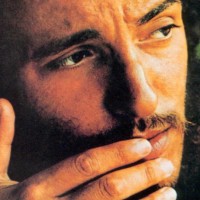Bruce Springsteen, for all his gifts as a big-picture chronicler and critic of America in the post-industrial age, is more than a stadium-rock star. His musically outsized examinations of this country’s promises, and the way they can remain unkept, have certainly made Springsteen millions. But an ability to narrow that focus to the internal struggles that guide us in our every day lives is what keeps me coming back to his work.
Springsteen tends to move back and forth, switching in rhythm between these two ideas. He’ll put out big records (1975’s Born To Run, 1980’s The River, 1984’s Born in the U.S.A., 1992’s companion pieces Human Touch/Lucky Town, 2002’s The Rising) and then, almost as a counterweight, follow that up with sparse, introspective efforts.
I’ve always been just as intrigued by these more personal asides – from 1978’s Darkness on the Edge of Town to 1995’s The Ghost of Tom Joad, from 1982’s Nebraska to 2006’s Pete Seeger tribute – since they seem to reveal more about Bruce Springsteen himself. He reaches less for storytelling than he does for simple truth.
That’s the place where we find Springsteen on Tunnel of Love, released on Oct. 9, 1987 as his marriage was falling apart in the wake of a non-stop touring schedule to support the multi-million-selling blockbuster Born in the U.S.A. Shot through with guilt, doubt and still darker things that move beneath a relationship, Tunnel of Love was – perhaps unsurprisingly – recorded mostly apart from the rest of his E Street Band.
This is an album about, more than anything, being alone: with your thoughts, with yourself and even, as with the No. 5 hit single “Brilliant Disguise,” inside of holy matrimony. (The accompanying video, in keeping with this period of raw emotion, was made in one continuous edit – and featured Bruce Springsteen performing a new live vocal, rare at the time.)
His sharp turns inward, coming from an artist known for broad character sketches set to even broader Phil Spector-esque walls of sound, resonate at home in a way that they might not at a sports facility. There is certainly no myth in this particular record, just real people grappling with real emotions. As with the deepest reaches of Nebraska and Tom Joad, you sense that this person is not some made-up mill worker, or some dolled-up Jersey girl, but Springsteen himself.
Though the first three songs on Tunnel of Love might suggest otherwise (in particular the playful “Ain’t Got You”), Bruce Springsteen seems dead set on dismantling the dream-weaving rebellion of Born to Run for a hard-eyed truth about the choices we make along the way.
“Spare Parts” begins like a screen-door slamming on that idealism: “Bobby said he’d pull out; Bobby stayed in. Janey had a baby; it wasn’t any sin. They were set to marry on a summer day; Bobby got scared and he ran away. We find the same shattering honesty inside “One Step Up,” “Walk Like a Man” and on the title track to Tunnel of Love – which makes a sharp comparison between relationships and a carnival ride.
There is much that marginalizes this effort, since your average rock fan in the nosebleed seats, straining to differentiate the tiny band members below, likely isn’t paying for that kind of willful intimacy. Really, though, this is what makes Springsteen an important artist.
If Tunnel of Love is less ambitious musically, it must have been far more difficult to construct lyrically, since the whole concept relies on connections made through a direct, every-day accounting of things. “It ought to be easy, ought to be simple enough,” Springsteen confides: “Man meets a woman, and they fall in love.” Not hardly, as the rest of this album confirms. Travelers here are often left praying for an answer, for a sign or, simply, for redemption. “So much has happened to me,” he sings, “that I don’t understand.”
Of course, this also isn’t really suitable material for happily married men. Bruce Springsteen, and again it’s perhaps no surprise, doesn’t perform these songs much anymore. He has since found love again, and became a doting father – a situation that doesn’t lend itself to lyrics like these: “I wanna know if it’s you I don’t trust, ’cause I damn sure don’t trust myself.” Still, I’m thankful that Springsteen gave his feelings an honest reading before hitting the road for another girder-rattling worldwide tour.
Albums like Tunnel of Love – still, to me, one of Bruce Springsteen’s very best – are the respite, a needed exhalation, before the cathartic, full-throated roar that inevitably follows with the E Street band.
- The Bright Spots in George Harrison’s Troubled ‘Dark Horse’ Era - December 29, 2024
- The Pink Floyd Deep Cut That Perfectly Encapsulates ‘The Wall’ - November 29, 2024
- Why Pink Floyd’s ‘The Endless River’ Provided a Perfect Ending - November 11, 2024




very fond of this and one of the first i bought on vinyl and and then re-bought on cd shortly after